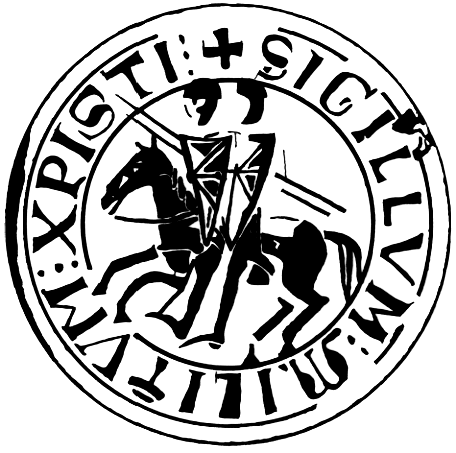
Original Requirements and Investiture Ceremony of a Knight of the Temple
Our Order, when fully developed, was composed of several classes: chiefly Knights, Chaplains and serving-brothers. Affiliated were those who were attached to the Order and worked for it therefore receiving its protection, without taking our vows.
A candidate for knighthood should prove that he is of Knightly family and entitled to the distinction. His father must be a Knight, or eligible to become one. He must prove that he was born in wedlock (the reason for this requirement is said to be not only religious: there was the possibility that a political head such as a King or Prince might influence the Order by managing to have one of his bastard sons enter it, later perhaps to rise to high rank therein, and finally attaching it to the service of his dominion.
The candidate must be unmarried and free from all obligations. He should have made no vow, nor entered any other Order; and he must not be in debt. note: Eventually the competition for admission became so great from eligible candidates that a very high fee was exacted from those who were to be monk-warriors of the Temple.
All candidates are to be Knighted before entry into the Order ( the period of probation which was originally demanded was entirely abolished). No young man could be admitted until he was twenty one years of age, because he was to be a soldier as well as a monk, and this was the minimum age at which he could bear arms.
When the new Knight was admitted to the Order, the ceremony was held in secret. The ceremony was held in one of the Order’s chapels, in the presence of the assembled chapter alone.
The Master (or the Prior, who took his place in chapels other than those which he was present) opened the proceedings:
“Beloved brethren, ye see that the majority are agreed to receive this man as a brother. If there be any among you who know anything of him, on account of which he cannot lawfully become a brother, let him say it; for it is better that this should be signified beforehand than after he is brought before us.”
If no objection was lodged, the aspirant was sent to a small room with two or three experienced Knights, to coach him in what he had to know: “Brother, are you desirous of being associated with the Order?” if he agreed, they would dwell upon the trials and rigours of being a Templar. He had to reply that for the sake of God he was willing to undergo anything and remain in the Order for life; they asked him if he had a wife or was betrothed; had he made vows to any other Order; did he owe money more than he could pay; was he of sound mind and body; was he the servant of any person?
After satisfactory answers, the result was passed to the Master. The assembled company was then asked again if they knew anything that may disqualify him. If none objected, they were asked: “Are you willing that he should be brought in, in God’s name?” The Knights answered, “Let him be brought in, in god’s name.”
The candidate was now again asked by his sponsors if he still desired to enter the Order. Receiving an affirmative reply, they led him to the chapter, where he folded his hands and literally flung himself upon his knees: “Sir, I am come before God and before you for the sake of God and our Dear Lady, to admit me into your Society, and the good deeds of the Order as one who will be all his life long servant and the slave of the Order.”
“Beloved brother,” answered the receptor, :you are desirous of a great matter, for you see nothing but the outward shell of our Order. It is only the outward shell when you see that we have fine horses and rich caparisons, that we eat and drink well and are splendidly clothed. From this you conclude that you will be well off with us. But you know not the rigorous maxims which are in our interior. For it is a hard matter for you, who are your own master, to become the servant of another. You will hardly be able to perform, in future, what you wish yourself. For when you may wish to be on this side of the sea, you will be sent to the other side; when you will wish to be in Acre, you will be sent to the district of Antioch, to Tripolis, or to Armenia; or you will be sent to Apulia, to Sicily, or to Lombardy, or to Burgundy, France, England, or any other country where we have houses and possessions.”
“When you will wish to sleep, you will be ordered to watch; when you will wish to watch, then you will be ordered to go to bed; when you will wish to eat, then you will be ordered to do something else. And as both we and you might suffer great inconvenience from what you have mayhap concealed from us, look here on the holy evangelists and the word of God and answer the truth to the questions which we shall put to you; for if you lie you will be perjured and may be expelled the Order, from which God keep you!”
All former questions were asked on Holy writ.
If the answers proved acceptable, the receptor continued:
“Beloved brother, take good care that you have spoken the truth to us: for should you have spoken false on any one point, you might be put out of the Order-from which God keep you! Now, beloved brother, attend strictly to what we shall say unto you. Do you promise to God, and to our dear Lady Mary to be, all your life long, obedient to the Master of the Temple, and to the prior who shall be set over you?”
“Yea, sir, with the help of God!”
“Do you promise to God, and to our dear Lady Mary, to observe all your life long, the laudable manners and customs of our Order, both those which are already in use and those which the master and Knights may add?”
“Yea, sir, with the help of God!”
“Do you promise to God, and to our dear Lady Mary, that you will, with the strength and powers which God has bestowed on you, help as long as you live to conquer the Holy Land of Jerusalem; and that you will, with all your strength, aid to keep and guard that which the Christians possess?”
“Yea, sir, with the help of God!”
“Do you promise to God, and to our dear lady Mary, never to hold (leave) this Order for stronger or weaker, for better or worse, than with the permission of the Master, or the chapter which has the authority?”
“Yea, sir, with the help of God!”
“Do you finally promise to God, and to our dear Lady Mary, never to be present when a Christian is unjustly and unlawfully despoiled of his heritage, and that you will never, by counsel or by act, take part therein?”
“Yea, sir, with the help of God!”
“In the name, then, of God, and our dear Lady Mary, and in the name of St. Peter of Rome, and of our father the Pope, and in the name of all the brethren of the temple, we receive to all the good works of the Order which has been performed from the beginning, and shall be performed to the end, you, your father, your mother, and all your family whom you will let have share therein. In like manner do you receive us to all the good work which you have performed and shall perform. We assure you of bread and water and the poor clothing of the Order, and labour and toile now.”
The candidate was admitted. The white mantle with its red cross was placed by the master over the neck of the candidate, and clasped firmly by him. The Chaplain recited the 132nd psalm and the prayer of the Holy Ghost, and each brother repeated a paternoster.
Then the Master and the Chaplain kissed the new entrant. As he sat down before the Master, the latter delivered him sermon on his duties.

Sigillum Militum Xpisti
CONTACT DETAILS
The Chancellor of the Order
E-mail: grandsecretary@gmail.com